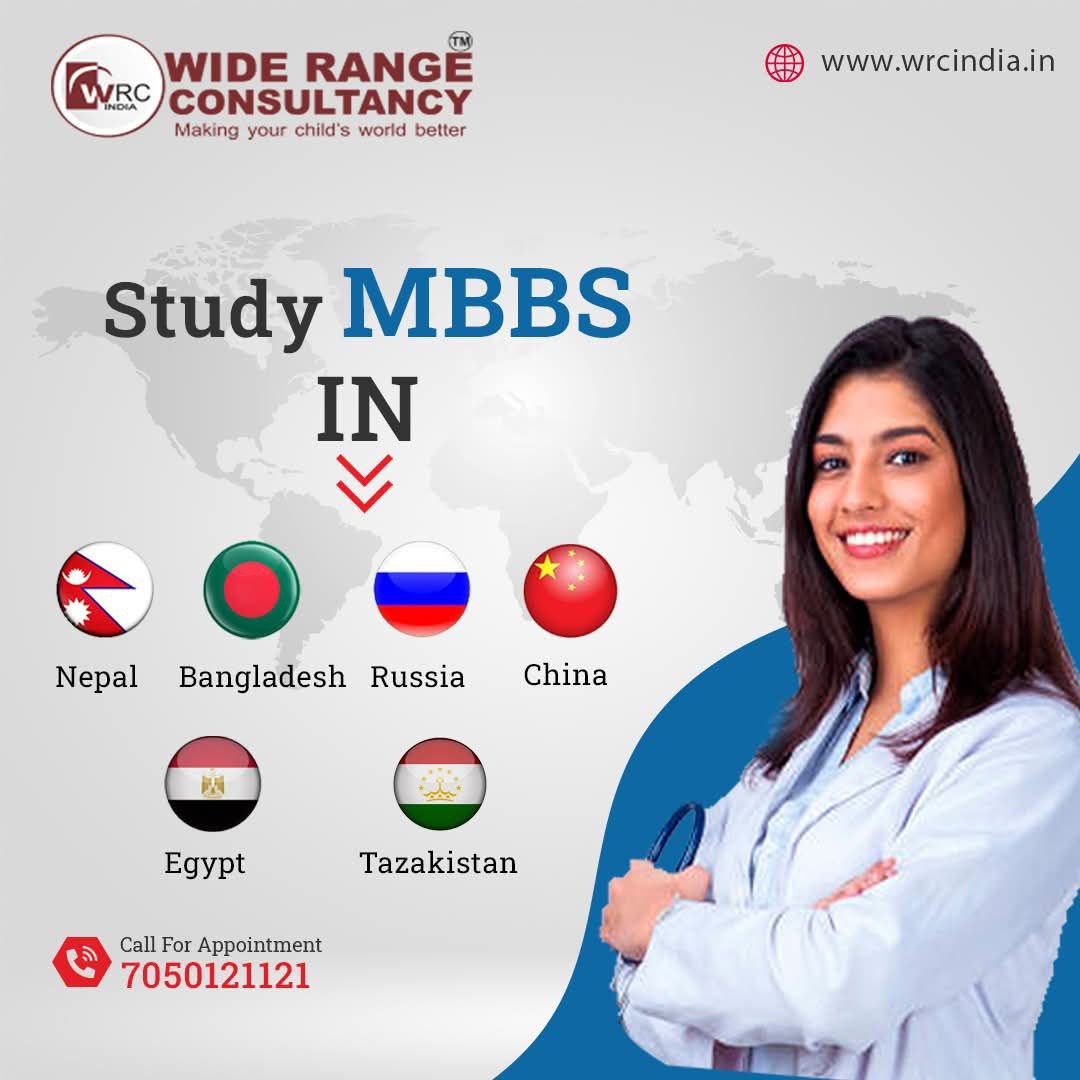Accurate Information About MBBS in Nepal: Fees, Colleges, Eligibility & More
Accurate Information About MBBS in Nepal: Fees, Colleges, Eligibility & More
Pursuing a medical degree is a dream for many students.
While options abound globally, neighbouring Nepal has emerged as a popular
destination, particularly for students from India. It offers a similar cultural
environment, geographical proximity, and a curriculum that often aligns well
with standards recognized in South Asia. However, navigating the process
requires accurate information, especially regarding MBBS in Nepal fees,
eligibility, and college options.
This article provides a comprehensive overview, addressing
common queries and offering a balanced perspective on studying MBBS in the
Himalayan nation.
Why Choose MBBS in Nepal?
Nepal presents several appealing factors for aspiring
medical students:
- Proximity
and Cultural Similarity: For Indian students, the short travel
distance and shared cultural values make the transition relatively smooth.
- Medium
of Instruction: English is widely used as the medium of
instruction in medical colleges, making it accessible for international
students.
- Recognized
Degrees: Medical degrees from many Nepali colleges are recognized
by various international bodies, including the National Medical Commission
(NMC) in India (subject to specific regulations and exit exams).
- Quality
Education: Many established colleges in Nepal adhere to
international standards of medical education.
- Lower
Cost (Compared to some private options in other countries): While
not universally cheap, MBBS in Nepal fees can be
competitive compared to private medical colleges in some other countries.
Eligibility Criteria for MBBS in Nepal
The primary eligibility criteria for admission to the MBBS
program in Nepal are set by the Medical Education Commission (MEC) of Nepal.
- Academic
Requirements:
- Completion
of 10+2 or equivalent examination with Physics, Chemistry, and Biology as
main subjects.
- A
minimum aggregate percentage/GPA, typically around 50% or equivalent in
the aggregate of PCB for general category students, with variations for
reserved categories.
- Age
Limit: Generally, the applicant must be at least 17 years old by
the end of the admission year.
- Entrance
Examination:
- All
students (Nepali and international) seeking admission to government or
private medical colleges in Nepal must clear the Medical
Education Common Entrance Examination (MECEE) conducted by the
MEC.
- For
Indian Students: It is crucial to understand that if you wish to
practice medicine in India after completing your MBBS in Nepal
for Indian students, you must have qualified the
National Eligibility cum Entrance Test (NEET) conducted in India.
Studying MBBS in Nepal without NEET qualification means
you will likely not be eligible to appear for the Foreign Medical
Graduate Examination (FMGE) or the proposed National Exit Test (NExT)
required to obtain a medical license in India. While admission to a
Nepali college might be possible based solely on the
MECEE, your ability to practice back home depends on NEET.
Understanding MBBS Fees in Nepal
The cost of studying MBBS in Nepal is a significant factor
for most students. MBBS in Nepal fees vary considerably based
on several factors:
- Type
of Institution: Fees in MBBS fees in Nepal government
College are significantly lower than those in private medical
colleges. Government colleges often have limited seats, largely reserved
for Nepali students on merit or specific quotas.
- Nationality: There
is a clear distinction between MBBS fees in Nepal for Nepali
students and Mbbs in nepal fees for indian students (or
other international students). International fees are generally higher.
- College
Ranking and Reputation: More established and highly-ranked
private colleges may have higher fee structures.
The MBBS fee structure in Nepal 2080 (referring
to the Nepali calendar year, corresponding roughly to late 2023 and 2024) is
determined and regulated by the Medical Education Commission (MEC). This aims
to bring some uniformity and transparency to the fees charged by colleges.
While discussing the Cheapest MBBS College in Nepal,
it's generally understood that government medical colleges offer the most
affordable options, primarily for Nepali citizens through merit-based admission
and scholarships. For international students, private colleges are the main
avenue, and their fees, while regulated, can still be substantial. Identifying
the absolute "cheapest" among private colleges requires comparing the
official fee structures released by the MEC or individual colleges each year.
Top Medical Colleges in Nepal with Fee Structure
(Approximate)
Nepal has several reputable medical colleges. Here is a list
of some well-known institutions, along with approximate total
fee ranges for the entire MBBS course for international (primarily Indian)
students.
Important Disclaimer: The fees listed below
are estimates based on recent years (MBBS fee structure in
Nepal 2080 and surrounding years). These figures are subject to change
based on MEC regulations, college policies, and fluctuations in exchange rates.
Always refer to the official websites of the colleges and the Medical Education
Commission (MEC) of Nepal for the most accurate and up-to-date fee information.
|
S.No |
College
Name |
Type |
Approximate
Total Fee Range (USD) for International Students |
Notes |
|
1 |
Institute
of Medicine (IOM), Tribhuvan University |
Government |
Varies
significantly; primarily for Nepali students via merit/quota |
Highly
competitive; limited international seats |
|
2 |
B.P.
Koirala Institute of Health Sciences (BPKIHS) |
Semi-Govt |
$55,000
- $65,000 |
Autonomous
institution, popular choice |
|
3 |
Kathmandu
Medical College (KMC) |
Private |
$60,000
- $75,000 |
Located
in Kathmandu |
|
4 |
Manipal
College of Medical Sciences (MCOMS) |
Private |
$60,000
- $70,000 |
Located
in Pokhara |
|
5 |
Nepalgunj
Medical College (NGMC) |
Private |
$55,000
- $65,000 |
Located
in Nepalgunj & Kohalpur |
|
6 |
Universal
College of Medical Sciences (UCMS) |
Private |
$55,000
- $65,000 |
Located
in Bhairahawa |
|
7 |
Gandaki
Medical College (GMC) |
Private |
$60,000
- $70,000 |
Located
in Pokhara |
|
8 |
Chitwan
Medical College (CMC) |
Private |
$60,000
- $70,000 |
Located
in Chitwan |
|
9 |
Nobel
Medical College (NMC) |
Private |
$55,000
- $65,000 |
Located
in Biratnagar |
|
10 |
Lumbini
Medical College (LMC) |
Private |
$55,000
- $60,000 |
Located
in Palpa |
Fees can vary based on the year of admission and
inclusions (like hostel, food, etc.). Always check the official prospectus.
Scholarship Opportunities
Scholarship for MBBS in Nepal is primarily
available for Nepali students, often through the government quota based on
merit in the MECEE exam. There are limited scholarships available for
international students, and these are highly competitive and may be offered by
specific institutions or through bilateral agreements. Indian students usually
secure seats based on the international fee structure.
Potential Disadvantages of Studying MBBS in Nepal
While there are many advantages, it's important to consider
the Disadvantages of studying MBBS in Nepal:
- Variable
Infrastructure: While top colleges have excellent facilities, the
quality of infrastructure and clinical exposure can vary between
institutions.
- Cost
of Private Education: As seen with the Mbbs in nepal fees
for indian students, the cost in private colleges is substantial and
needs careful financial planning.
- NEET
Requirement for Indian Students: As mentioned, the need to
qualify NEET in India is a mandatory step for Indian students wishing to
practice in their home country, adding another hurdle. MBBS in
Nepal without NEET is generally not a viable path for practicing
in India.
- Regulation
and Policy Changes: Like any country, regulations regarding fees,
admissions, and licensing can change, which might affect students.
- Language
Barrier outside Academics: While English is used for teaching,
learning basic Nepali can be helpful for daily life and interacting with
patients during clinical postings (though hospitals often have translators
or senior students assist).
Admission Process Overview
The general process for admission to MBBS in Nepal involves:
- Qualifying
the NEET exam (for Indian students planning to practice in India).
- Appearing
for and qualifying the Medical Education Common Entrance Examination
(MECEE) conducted by MEC, Nepal.
- Participating
in the counseling process based on MECEE rank.
- Selecting
colleges based on rank and availability.
- Completing
admission formalities and fee payment.
Conclusion
Studying MBBS in Nepal offers a promising
pathway for aspiring doctors, particularly for Indian students seeking quality
education within a familiar setting. While proximity and cultural ease are
significant drawcards, prospective students must conduct thorough research.
Understanding the accurate MBBS in Nepal fees – distinguishing
between MBBS fees in Nepal government College and private
institutions, and the difference in Mbbs in nepal fees for indian
students vs. MBBS fees in Nepal for Nepali students –
is paramount. Additionally, being fully aware of the eligibility criteria,
including the mandatory NEET qualification for practice in India, and
considering the potential Disadvantages of studying MBBS in Nepal,
will help students make an informed decision. Always rely on official sources
like the Medical Education Commission of Nepal and the specific college
websites for the most current information regarding the MBBS fee
structure in Nepal 2080 and beyond.
Frequently Asked Questions (FAQs)
- Q1:
Is NEET mandatory for studying MBBS in Nepal for Indian students?
- A: Yes,
if an Indian student wishes to practice medicine in India after
completing their degree from Nepal, they must have
qualified NEET as per the regulations of the National Medical Commission
(NMC) of India.
- Q2:
How much are the MBBS fees in Nepal for Indian students?
- A: Mbbs
in nepal fees for indian students in private colleges typically
range from USD 55,000 to USD 75,000 or more for the entire course,
depending on the college. Government colleges have much lower fees but
very limited seats for international students.
- Q3:
What is the difference between MBBS fees for Nepali students and Indian
students?
- A: MBBS
fees in Nepal for Nepali students are significantly lower,
especially in government colleges, often benefiting from subsidies or
merit-based free seats. International students, including Indians, pay
higher fees.
- Q4:
Can I study MBBS in Nepal without NEET?
- A: While
it might technically be possible to get admission based on Nepal's MECEE
in some cases, studying MBBS in Nepal without NEET qualification
renders an Indian student ineligible to appear for the licensing exam
(FMGE/NExT) to practice in India. So, for most Indian students, NEET is
effectively mandatory.
- Q5:
Are there any scholarships for MBBS in Nepal?
- A: Scholarship
for MBBS in Nepal is primarily available for Nepali students
through government quotas and merit. Opportunities for international
students are very limited and highly competitive.
- Q6:
Which are the top medical colleges in Nepal?
- A: Some
of the Top 10 medical colleges in Nepal include IOM
(Tribhuvan University), BPKIHS, KMC, Manipal, NGMC, UCMS, GMC, CMC,
Nobel, and Lumbini Medical College, among others.
- Q7:
What are the main disadvantages of studying MBBS in Nepal?
- A: Key Disadvantages
of studying MBBS in Nepal can include the relatively high cost
of private education, variable infrastructure depending on the college,
the mandatory NEET requirement for practicing in India, and potential
policy changes.
- Q8:
Is the MBBS fee structure in Nepal regulated?
- A: Yes,
the Medical Education Commission (MEC) of Nepal regulates the MBBS
fee structure in Nepal 2080 and subsequent years for both
government and private colleges to ensure transparency and uniformity.
- Q9:
Which is the cheapest MBBS College in Nepal?
- A: Government
medical colleges are the Cheapest MBBS College in Nepal, but
seats are very limited and mostly for Nepali students on merit. Among
private colleges, fees are competitive, and the "cheapest" can
vary slightly each year – checking the latest MEC notifications is
essential.

